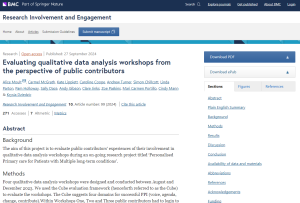Involving public contributors in qualitative data analysis
7 October 2024
Researchers working on the Personalised primary care for patients with multiple long-term conditions study (PP4M) successfully involved public contributors in analysing interview data, by co-creating a training package with them.
Contributors were introduced to qualitative data analysis methods and felt that they were able to contribute in diverse ways.
The study team co-produced recommendations on including patient and public involvement (PPI) within qualitative data analysis. Researchers considering this approach should:
- Identify learning needs of public contributors and co-produce resources or workshops that will address these learning needs
- Send out relevant information sources or materials but ensure that there are clear goals and/or instructions before any PPI activity
- Consider which stakeholders are required to run the sessions (e.g. qualitative researchers, PPI co-ordinator)
- Be responsive to the public contributors during workshops to ensure their interests and learning needs are incorporated (this may mean being flexible in terms of activities)
To evaluate how contributors experienced the workshops they took part in, the study team used the Cube evaluation framework. The framework describes the four domains needed for successful knowledge exchange:
- Voice – whether contributors feel they have a weak or strong voice in decision-making
- Contribute – the number of ways contributors can get involved
- Agenda – the balance between organisation and public contributor concerns
- Change – how willing or resistant an organisation or project is to change
Dr Carmel McGrath, a member of the study team, said:
“Our evaluation has shown that public contributors can gain new skills and lead qualitative data analysis discussions. Contributors reported that they felt heard and valued the opportunities to learn and gain new skills.
“Some technical difficulties meant that we had to adapt our evaluation approach, which is a benefit of using the Cube evaluation framework. Once we did this, contributors were able to successfully complete their evaluations.”
Paper

